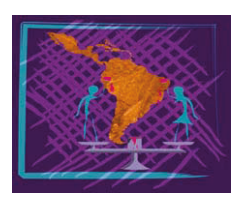Women's Work Is Key to Overcoming Poverty in Latin America and the Caribbean
Work area(s)
But profound gender inequalities persist in terms of income, social protection and distribution of the workload.
Gender parity, more than a quantitative concept, refers to the redistribution of power in three specific spheres: the labour market, decision-making and family life. The sexual division of labour is a source of inequality between women and men. So states ECLAC in its document "Women's Contribution to Equality in Latin America and the Caribbean," presented to the 10th Regional Conference on Women in Latin America and the Caribbean currently underway in Quito, Ecuador.
This document examines women's contributions to the economy and social protection, especially in relation to unpaid work, which -- unlike paid employment -- has been largely absent from historical analysis, economic studies and public policies.
While women's entry into the labour market is widely viewed as one of the 20th century's most important trends, profound inequalities continue to characterize women's work, with least 50% of women over the age of 15 having no income of their own, as compared to 20% of men.
In the region, women's labour income is equivalent to 70% that of men. Women also receive lower pensions and suffer from inequality under social security systems.
Despite this disadvantage, women's contribution is fundamental for alleviating poverty, whether they earn a monetary income or contribute to the home through unpaid labour. Women's access to the job market is conditioned by the so-called "reproductive tax" of unpaid work at home, product of the unwritten agreement that universally enshrines men in the role of family provider and women as caregivers.
The ECLAC document underscores the need to broaden the concept of work. Work is not employment. As a human activity, work includes both paid activities carried out within the framework of the marketplace and the unpaid ones conducted outside its margins. Social well-being and economic growth are both generated by the labour of women and men, paid and unpaid.
Domestic "service" is the main source of employment for women in Latin America and the Caribbean, and included in most labour codes. However, there has been a tendency to regulate domestic work without regard for or recognition of the acquired rights accruing to most wage earners in other types of employment. This highlights the particular vulnerability of the region's poorest women, who form the ranks of domestic workers and face greater exploitation in terms of working hours and pay.
Unpaid domestic work - which refers to caregiving activities on behalf of children, the sick and the elderly, falls largely to women. According to information from ECLAC, of the average 12 hours that women work daily, over five is devoted to caregiving, whereas men work an average of 10.7 hours, of which 7.8 are paid.
The increasing demand for care has important implications for public policies. The sustained growth in the numbers of elderly, for example, is taking place in societies that have yet to create the necessary conditions to accommodate this trend and face its repercussions.
According to the document, public policies are needed to create incentives for shared responsibility between women and men in both the public and private spheres, to facilitate the workload of both sexes, improve the conditions of women's entry into the labour market, and encourage the active participation of men in unpaid domestic chores.
Time use surveys are a useful instrument for analyzing work, taking into account the links between the public and private domains, and for studying the "social contract" that governs day-to-day relations between men and women in homes and society. This information can provide valuable input for the formulation of equitable public policies.
The reconciliation of family and work is now part of the public agenda. According to the mechanisms for the advancement of women, there is a need to harmonize family and work through legislation, public policies and programmes such as childcare services and leave from work for breastfeeding mothers.
Related content

X session of the Regional Conference on Women in Latin America and the Caribbean
The tenth session of the Regional Conference on Women in Latin America and the Caribbean was convened by the Executive Secretary of the Economic Commission for Latin America and the Caribbean …
Toward Gender Parity in Political Representation for Women in Latin America and the Caribbean
ECLAC document highlights political participation as a universally-recognized instrument for women's empowerment and gender equity.
Political Figures from Latin America and Spain Inaugurate the 10th Regional Conference on Women
Heads of Women's Ministries and gender-policy authorities from most of the Latin America and Caribbean countries are participating.
Latin American and Caribbean countries approve Quito consensus
The document reaffirms commitments to ensure women's political participation and recognition of their contribution to the economy and social protection.
Contact
Public Information Unit
- prensa@cepal.org
- (56 2) 2210 2040
